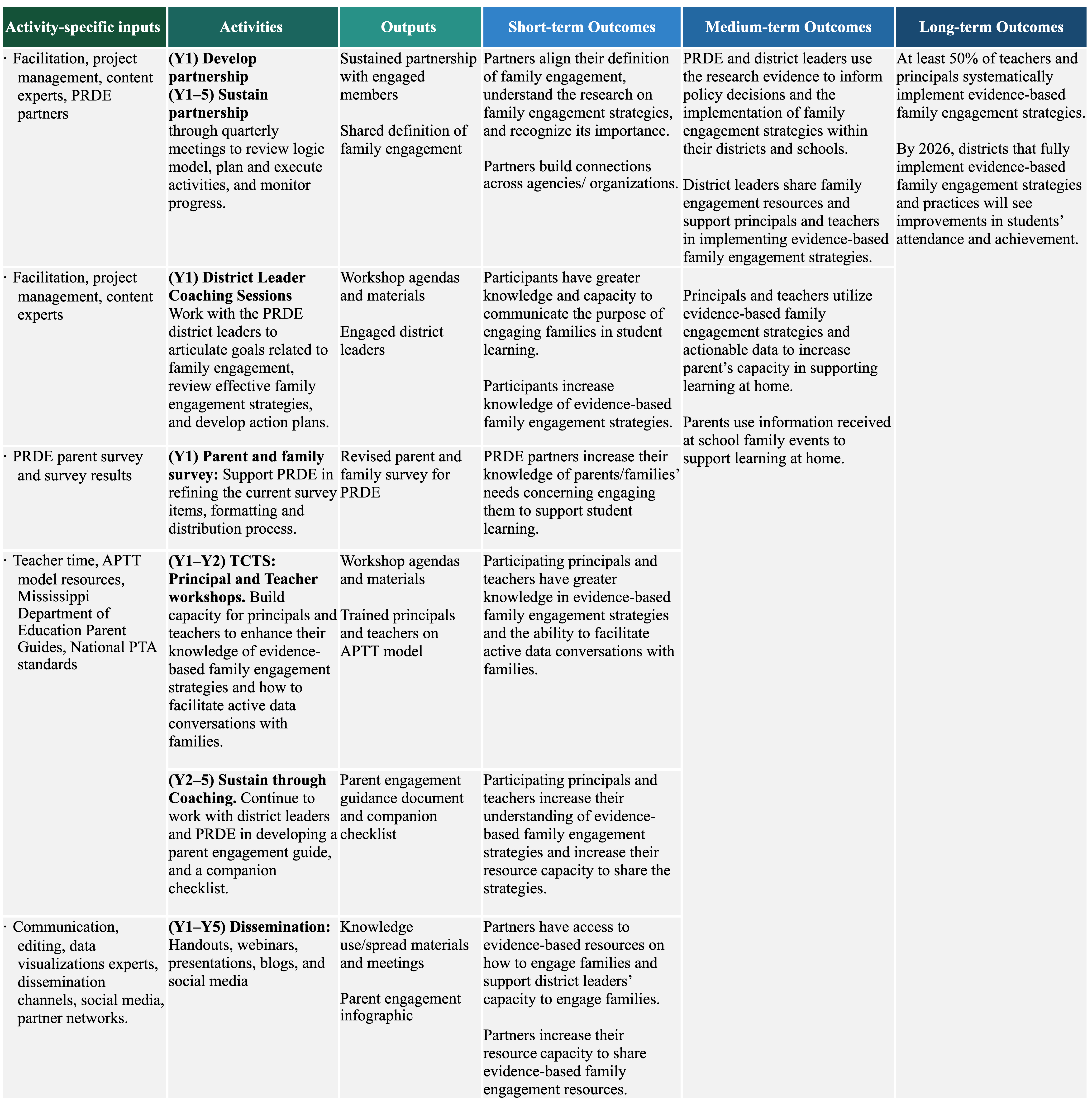Home REL Northeast & Islands About REL Northeast & Islands Puerto Rico Partnership to Engage Families in Data Use
Puerto Rico Partnership to Engage Families in Data Use
Parental involvement in a child’s education and family–school partnerships can have a systematic and sustained effect on learning outcomes for children.1, 2, 3, 4, 5, 6, 7 Moreover, family engagement has been shown to be the strongest predictor of student achievement.8 Therefore, this partnership aims to improve student outcomes by building educators’ capacity to design and implement clear, data-driven communication with families about students’ academic and behavioral progress. In turn, families will be able to use data to advocate for and support their children’s learning needs.
As part of a legislative initiative, Puerto Rico has embarked on a Family Engagement Initiative requiring its Department of Education to develop an action plan to support and broaden schools’ efforts to promote robust family engagement. REL Northeast & Islands will support these efforts with research-based resources and best practices for sustainable strategies for engaging families to use and understand data to support their children in their academic experiences. This will include assessing parents and families’ data needs and providing coaching to district leaders on action planning to enhance family engagement. REL Northeast & Islands will also train principals and teachers in how to effectively implement the Academic Parent-Teacher Teams model, which is a research-based family engagement model focused on parent and teacher partnerships. Additionally, REL Northeast & Islands and its partners will co-develop a dissemination plan to spread awareness and deepen understanding about, support access to, and facilitate sharing of partnership resources, using strategies such as an infographic for families showing how to access available data about their students and schools and then to use that data to support their students’ education.
Partner Organizations: Puerto Rico Department of Education, Puerto Rico Education Foundation, and Puerto Rico Community Foundation
1 Bryk, A. S., Sebring, P. B., & Allensworth, E. (2009). Organizing schools for improvement: Lessons from Chicago. Chicago: University of Chicago Press.
2 Dearing, E., Kreider, H., & Weiss, H. B. (2008). Increased family involvement in school predicts improved child-teacher relationships and feelings about school for low-income children. Marriage & Family Review, 43(3/4), 226–254.
3 DeCastro, B. S., & Catsambis, S. (2009). Parents still matter: Parental links to the behaviors and future outlook of high school seniors. In N. Hill and R. Chao, (Eds.), Families, schools, and the adolescent: Connecting research, policy, and practice. New York: Teachers College Press.
4 Henderson, A.T., & Mapp, K. L. (2002). A new wave of evidence: The impact of school, family, and community connections on student learning. Austin, TX: Southwest Education Development Laboratory.
5 Jeynes, W. H. (2005). A meta-analysis of the relation of parental involvement to urban elementary school student academic achievement. Urban Education, 40(3), 237–269.
6 Jeynes, W. H. (2007). The relationship between parental involvement and urban secondary school student academic achievement. Urban Education, 42(1), 82–110.
7 Jeynes, W. (2012). A meta-analysis of the efficacy of different types of parental involvement programs for urban students. Urban Education, 47(4), 706–742.
8 Henderson, A.T., & Mapp, K.L. (2002). A New Wave of Evidence: The Impact of School, Family, and Community Connections on Student Achievement. National Center for Family and Community Connections with Schools and SEDL. https://sedl.org/connections/resources/evidence.pdf
Current Projects
In this series of training, coaching, and technical support activities, REL Northeast & Islands is supporting the Puerto Rico Department of Education (PRDE) in building the capacity of leaders and educators to design and implement clear, data-driven communication with families about students’ academic and behavioral progress. The REL Northeast & Islands team is supporting PRDE in developing goals and identifying evidence-based strategies to effectively involve families in their students’ learning and incorporate those strategies into action plans. These action plans will include the district’s professional development needs (such as teacher planning time), family engagement practices, the infrastructure needed to support the new practices, and ways to monitor these practices.
No past projects at this time.
REL Northeast & Islands Logic Model (266 KB)
